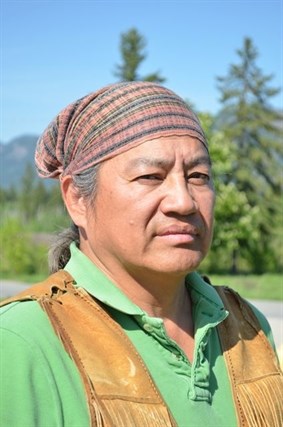
Wunuxtsin Kukpi7 Wayne Christian, Splatsin Chief
(CHARLOTTE HELSTON / iNFOnews.ca)
May 10, 2013 - 12:13 PM
His people gave him the name Wunuxtsin. It means "loud voice" and belonged to his great, great grandfather.
Kukpi7 (Chief) Wayne Christian of the Splatsin Indian Band uses his voice to tell stories, to teach the ways of his people, and to advocate First Nations rights. In his voice are echoes of wind and thunder and the resonance of drums.
Sitting in his Enderby office, just a short ways from where he was born, Wunuxtsin shares the story of his life. He's done many interviews with media over his political career, but says this is the first time he's spoken with a reporter about his personal life and spiritual journey.
Wunuxtsin is 59 and dressed today in a handmade deer skin vest. An earring dangles from his left ear. This week, he learned Thompson Rivers University will be presenting him with an honourary doctorate in law.
"It's surreal for me. The things I've done in my life, to others it might seem like something, but to me, I just did it. It was my life," Wunuxtsin says of receiving such a high honour.
He says his first leadership role was in 1971 when he was elected president of the student council at Armstrong Secondary in grade 11. After high school, he did two years at the University of Victoria, majoring in education and history. Outside of class, he became deeply involved with the native student union.
"We'd gather, talk politics. It was a time of the renaissance of being Indian—red power, lots of demonstrations," he says. "What emerged from that was the notion that we had to go home and help out, so I bailed out of school."
Wunuxtsin grew up during the Sixties Scoop, a time when many First Nations children were taken from their families and communities and placed in the child welfare system. Wunuxtsin says the Splatsin had about 100 children plucked from the community in the '60s. He was one of them.
"Everything that happened to our people happened to me personally," he says. "I've been through the abuse, foster care. I've contemplated suicide. I understand those issues. I had to learn to go beyond that pain, to begin healing and reconnecting with my origins; my language, culture, traditions."
He returned to his birthplace in the late 70s, became a councillor at age 23, and chief at 25. One of his first goals was to bring responsibility of First Nations youth back into the community. He mounted a political campaign and led 1000 people across the province in lobbying the government to recognize the band's jurisdiction over its youth. Wunuxtsin used his voice, and it was heard. The provincial government agreed to adopt a bylaw giving the Splatsin the right to look after their own. To this day, it is the only legislation of its kind in Canada.
In 1980-81 Wunuxtsin was chairman of the Constitutional Express, leading delegations across the globe in asserting that Canada was founded on not two, but three nations: Indian Nations, English and French. The movement culminated in Section 35.1 of the Canada Act, which affirms existing Aboriginal Treaty Rights. He says Section 37 was also adopted at that time. It called for a sit down between the government of Canada and First Nations.
"That never happened, which is why things are the way they are today," Wunuxtsin says.
Over his career, Wunuxtsin has learned one of the most important parts of resolving First Nations issues is rooted at the local level.
"For me now, it is about wellness for our community," he says. "Strengthening families, our culture, economics."
Wunuxtsin didn't grow up learning the traditional ways of the Splatsin, or their language. He says Native culture had gone underground when he was a child. People were afraid to participate in ceremonies, and kept sacred items hidden for fear of having them burned by white people.
He knew he had to learn the old ways if he wanted to help his people. He remembers going into the mountains by himself for his first spiritual fast and the sense of oneness he felt.
"When you become one with the earth everything amplifies. It's like a grounding. It's part of who we are."
Three years ago, Wunuxtsin began learning the Splatsin language. "In order to understand the land, you have to connect with the language," he says. "Where I live is called clcahl. It means the place at the base of the mountain. Our language places you in the land. It's the piece that was beaten out of our people."
He says the language is close to extinction with an estimated 20 fluent elders in a population of 900. With the language, traditional wisdom is also being lost.
He's constantly absorbing knowledge from his community. At the moment, he's building his first pit house.
"I needed a place for ceremonies, a place to teach my grandkids," he says.
Wunuxtsin is a father of seven and grandfather of 18. "What we leave behind, our legacy, is our children and what we teach them. That's why I immersed in my culture, to teach them and ensure a better future."
Wunuxtsin served as chief from 1979 to 1987 and was re-elected in 2005. He's travelled across the world, visiting indigenous communities in Africa and New Zealand.
"There's no place like our homeland. I've been around the world, but nothing compares to coming back and finding that connection to land and people."
To contact the reporter for this story, email Charlotte Helston at chelston@infotelnews.ca or call (250)309-5230.
News from © iNFOnews, 2013